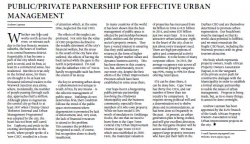Public/Private Partnership for effective Urban Management - Andrew Layman2016-08-24 Whether one lives and works north across the river, or retreats each day to the less frenetic western suburbs, the heart of Durban is its central business district. Regrettably, it has become a part of the city which many seek to avoid, and its beat, at least in a commercial sense, has weakened. But this is true only in the formal sense, for there are thought to be at least ten thousand informal traders in the Warwick Junction area alone, where, incidentally, the number of people passing through each day, approaches half a million. Although plans to regenerate the central city go back to at least 1997 when iTrump (Inner Thekwini Renewal and Urban Management Programme) was adopted by the city, the
heart has not been well cared for. Euphoria and pride in the exciting developments in the north, where people spoke of a ‘new CBD’, resulted in a focus of attention which, at the same time, neglected the real CBD. The effects of this neglect are profound. Not only has the value of CBD properties declined to the notable detriment of the city’s financial welfare, but the areas to the south of the city have also suffered; the effects of having the back turned while the gaze to the north is perpetuated. I’m told that the suburban CBD of ‘Toti is hardly recognisable such has been the extent of its decay. The key to arresting urban decay â€" a phenomenon not unique to South Africa, by any means â€" is the effective management of public space. Buildings do not deteriorate first; their condition follows the trend of the public space environment where degeneration is promoted by lack of enforcement, and, very soon, the lack of financial resources to attend to the problem. This assumes the problem is recognised as such, of course, but recognition alone is clearly insufficient. In many countries of the world it has been shown that the best management of public space is effected by partnerships between public entities and the private sector’s property owners. They have a vested interest in ensuring that they yield satisfactory returns in the form of higher rentals, higher market values and dynamic business activity. This has been shown in this country, too, but, unfortunately, not in our inner city, despite the best efforts of the Urban Improvement Precincts which have been established in some areas there. Our hope lies in a burgeoning public/private partnership involving the eThekwini Municipality and the business community, especially those members of it who own property. While we have model UIPs worth of emulation in Umhlanga Rocks, the one that we need to learn from is the Cape Town Central City Urban Improvement District (Cape Town CCID) which was established in 2000. Here, the municipal valuation of properties has increased from R6 billion in 2006 to R21 billion in 2014, and some R35 billion just two years later. It is a most attractive urban landscape, right in the heart of the city, close to just about every transport need. There are high perceptions of safety and commercial activity flourishes. It is the home of many corporate offices. In 2015, the average occupancy rate across all commercial property categories was 90%, rising to 95% for those offering retail space. If it can be done there, it can be done here. Cape Town has thirty-five CIDs, and our number of fewer than ten is paltry by comparison. It requires strong political will and a determination not to shelve plans and recommendations, as has been done so frequently in the past. At present, an urban generation plan is being crafted, and will give excellent direction, but the real game-breaker will be action and delivery. We must support large property investors who have put their faith in the Durban CBD and are themselves determined to promote urban regeneration. Our beachfront must be managed so that its world-class potential is fulfilled, and we must resuscitate the fragile CBD heart, including the Warwick precinct with its great tourism attraction. The body which represents property owners, South African Property Owners Association (Sapoa), is in the vanguard of the private sector push for constructive dialogue with the Municipality in order to establish a formal strategic partnership to tackle the issues of urban management. Progress is being made, but, as in so many things, it cannot be done overnight. Andrew Layman has been appointed by the KZN branch of the South African Property Owners Association to lead Urban Improvement projects in the city. E-mail: layman.uip@gmail.com |
Public/Private Partnership for effective Urban Management - Andrew Layman
Copyright © 2024 KwaZulu-Natal Top Business
